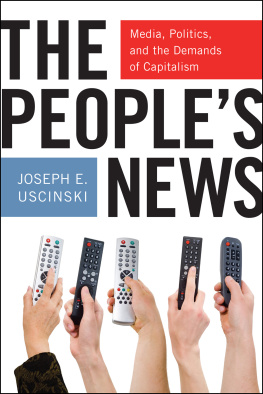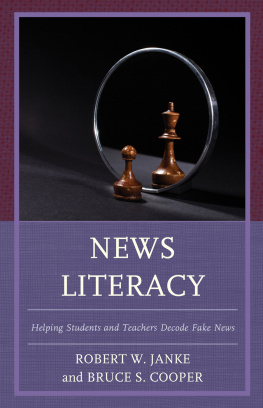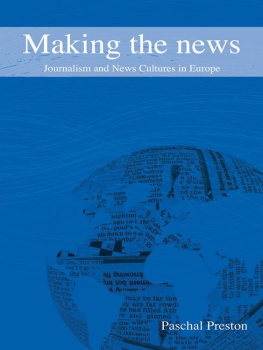
Anthropology of Media
Series Editors: John Postill and Mark Peterson
The ubiquity of media across the globe has led to an explosion of interest in the ways people around the world use media as part of their everyday lives. This series addresses the need for works that describe and theorize multiple, emerging, and sometimes interconnected, media practices in the contemporary world. Interdisciplinary and inclusive, this series offers a forum for ethnographic methodologies, descriptions of non-Western media practices, explorations of transnational connectivity, and studies that link culture and practices across fields of media production and consumption.
Volume 1
Alarming Reports
Communicating Conflict in the Daily News
Andrew Arno
Volume 2
The New Media Nation
Indigenous Peoples and Global Communication
Valierie Alia
Volume 3
News as Culture
Journalistic Practices and the Remaking of Indian Leadership Traditions
Ursula Rao
Volume 4
Theorising Media and Practice
Edited by Birgit Bruchler and John Postill
Volume 5
Localizing the Internet
An Anthropological Account
John Postill
Volume 6
The Making of the Pentecostal Melodrama
Religion, Media and Gender in Kinshasa
Katrien Pype
News as Culture
Journalistic Practices and the Remaking of Indian Leadership Traditions
Ursula Rao
Published in 2010 by
Berghahn Books
www.berghahnbooks.com
2010, 2013 Ursula Rao
First paperback edition published in 2013
All rights reserved. Except for the quotation of short passages for the purposes of criticism and review, no part of this book may be reproduced in any form or by any means, electronic or mechanical, including photocopying, recording, or any information storage and retrieval system now known or to be invented, without written permission of the publisher.
Library of Congress Cataloging-in-Publication Data
Rao, Ursula.
News as culture : journalistic practices and the remaking of Indian leadership traditions / Ursula Rao.
p. cm. -- (Anthropology of media ; v. 3)
Includes bibliographical references and index.
ISBN 978-1-84545-669-6 (hbk.)--ISBN 978-0-85745-905-3 (pbk.)
1. Journalism--Political aspects--India. 2. Press and politics--India. 3. Journalism--Social aspects--India. 4. Hindi newspapers--India. 5. English newspapers--India. I. Title.
PN5377.P6R36 2010
302.230954--dc22
2010007969
British Library Cataloguing in Publication Data
A catalogue record for this book is available from the British Library
Printed in the United States on acid-free paper.
ISBN: 978-0-85745-905-3 (paperback) eISBN: 978-0-85745-926-8 (retail ebook)
List of Abbreviations
| AIADMK | Anna's Dravida Munnetra Kazhagam (Federation for the Advancement of the Dravidians) |
| BHU | Banaras Hindu University |
| BSP | Bahujan Samaj Party (Majority Society Party) |
| BJP | Bharotiya Janta Party (Indian People's Party) |
| CM | Chief Minister |
| KSRSS | Kashi Sanskriti Raksha Sangharsh Samiti (Organisation for the Defence of the Culture of Kashi) |
| LDA | Lucknow Development Authorities |
| MLC | Member of Legislative Council |
| MLA | Member of Legislative Assembly |
| OBC | Other Backward Classes |
| RKP | Rashtriya Kranti Party (National Revolutionist Party) |
| RSS | Rashtriya Svayam Sevak Sangha (National Voluntary Service Organisation) |
| SP | Samajvadi Party (Socialist Party) |
| UP | Uttar Pradesh (State in North India) |
| V-C | Vice-Chairman |
| VHP | Vishva Hindu Parishad (World Hindu Association) |
List of Figures and Tables
Figures
Tables
Acknowledgements
There are many people who have helped me in the making of this book too many to thank individually. But let me mention at least a few. I wish to offer special thanks to all the people in Lucknow who made this study possible. I am very grateful to the Lucknow residential editors of Times of India, Hindustan Times, Hindustan and Dainik Jagaran who were exceptionally generous to me. I was made welcome, allowed to work in their organisations and given free reign to conduct interviews. Throughout my study I found the journalists to be extremely patient and kind in their responses to my requests. My presence created extra work for many yet all possible support and assistance was given.
I feel particularly indebted to Hemand Narayan and Uttam Sengupta. Uttam and his wife were always available for my questions and worries. They became personal friends whose emotional support I cherished a great deal; their kindness carried me through many difficult days. I want to thank Hemand who was a fantastic facilitator. No matter how complicated the task I wanted accomplished, he always found a way. He stayed in contact via email for all the years of writing up my study and always produced an answer to my queries. He provided many insights into the publishing business and I am grateful for his friendship.
In order to protect the anonymity of my informants, I have changed all names in the text. I refer to persons by real name only if they are public personalities, who received media attention. Members of the writing professions are never referred to by their real names.
I also wish to thank the Gupta family, who hosted me during my stay and generously shared their home with me and treated me like their own daughter. I am particularly indebted to Mrs Gupta for her care and attentiveness to my small daughter during the long hours of my absence for work. I also enjoyed the company of many Indian academics who helped me grow intellectually, supported me in making sense of my data and facilitated my work organisationally. I especially want to mention Veena Das and Dipankar Gupta for their support and intellectual input.
My academic development was influenced greatly by Klaus-Peter Kpping. I admire him for his great knowledge, his innovative thinking and thank him for the trust and time he invested in me. I remember with delight the many heated debates we had about theories and developments in the social sciences. In Halle I worked with Burkhart Schnepel who was a fantastic mentor. He always asked the right questions and thus contributed significantly to shaping the final version of this book. There were many others in Halle who helped me refine my argument. I want to thank Richard Rottenburg and Thomas Kirsch for many helpful comments and support as well as Patrick Neveling for listening to all my worries over many coffees. I also want to mention the joint colloquium of the Institute of Anthropology and Max-Planck Institute for Social Anthropology. These regular meetings were extremely inspiring and the comments I received for my draft papers made me think afresh. Furthermore I profited from the lively debate of the EASA Media Anthropology network organised by John Postill. It is an excellent platform and a very supportive intellectual environment. There are many others who commented at conferences or meetings. I want to mention especially Frank Heideman, Per Sthlberg, John Postill, Nina Glick-Schiller and Steve Reyna. Finally, there are many anonymous reviewers whose comments helped me revise and refine my argument.






